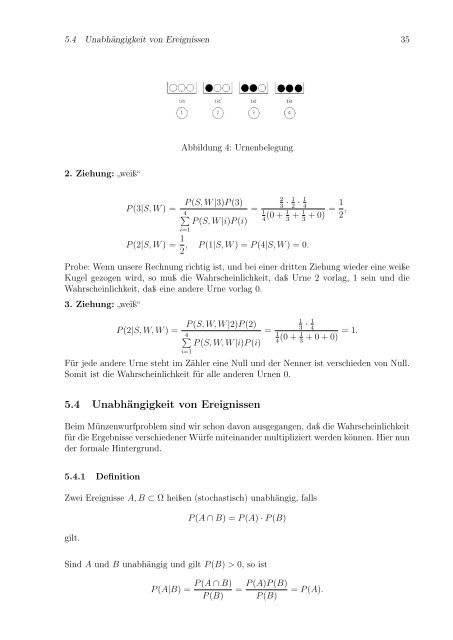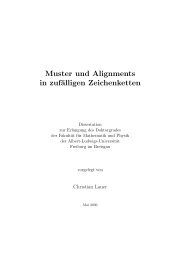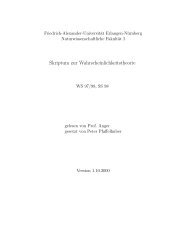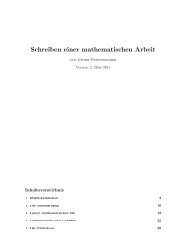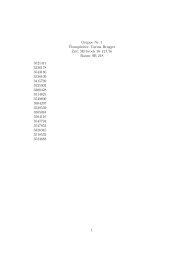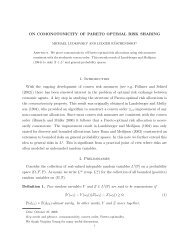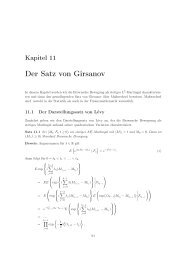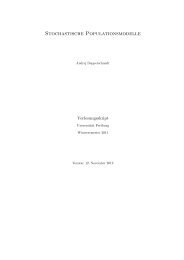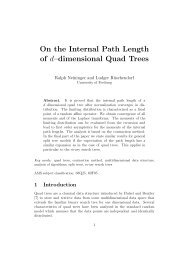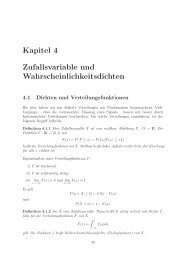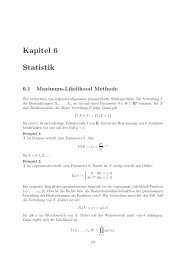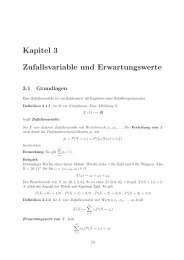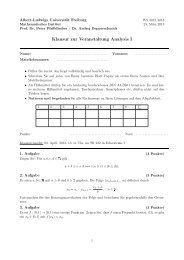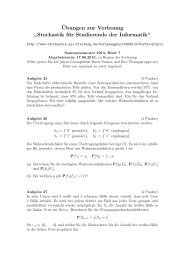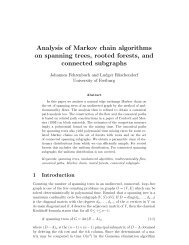Einführung in die Stochastik, Prof. Lerche - Abteilung für ...
Einführung in die Stochastik, Prof. Lerche - Abteilung für ...
Einführung in die Stochastik, Prof. Lerche - Abteilung für ...
Erfolgreiche ePaper selbst erstellen
Machen Sie aus Ihren PDF Publikationen ein blätterbares Flipbook mit unserer einzigartigen Google optimierten e-Paper Software.
5.4 Unabhängigkeit von Ereignissen 35<br />
Abbildung 4: Urnenbelegung<br />
2. Ziehung: „weiß“<br />
P (3|S, W ) =<br />
P (S, W |3)P (3)<br />
=<br />
4∑<br />
P (S, W |i)P (i)<br />
i=1<br />
2 · 1 · 1<br />
3 2 4<br />
1<br />
(0 + 1 + 1 + 0) = 1 2 ,<br />
4 3 3<br />
P (2|S, W ) = 1 , P (1|S, W ) = P (4|S, W ) = 0.<br />
2<br />
Probe: Wenn unsere Rechnung richtig ist, und bei e<strong>in</strong>er dritten Ziehung wieder e<strong>in</strong>e weiße<br />
Kugel gezogen wird, so muß <strong>die</strong> Wahrsche<strong>in</strong>lichkeit, daß Urne 2 vorlag, 1 se<strong>in</strong> und <strong>die</strong><br />
Wahrsche<strong>in</strong>lichkeit, daß e<strong>in</strong>e andere Urne vorlag 0.<br />
3. Ziehung: „weiß“<br />
P (2|S, W, W ) =<br />
P (S, W, W |2)P (2)<br />
=<br />
4∑<br />
P (S, W, W |i)P (i)<br />
i=1<br />
1<br />
4 (0 + 1 3<br />
1 · 1<br />
3 4<br />
+ 0 + 0)<br />
= 1.<br />
Für jede andere Urne steht im Zähler e<strong>in</strong>e Null und der Nenner ist verschieden von Null.<br />
Somit ist <strong>die</strong> Wahrsche<strong>in</strong>lichkeit für alle anderen Urnen 0.<br />
5.4 Unabhängigkeit von Ereignissen<br />
Beim Münzenwurfproblem s<strong>in</strong>d wir schon davon ausgegangen, daß <strong>die</strong> Wahrsche<strong>in</strong>lichkeit<br />
für <strong>die</strong> Ergebnisse verschiedener Würfe mite<strong>in</strong>ander multipliziert werden können. Hier nun<br />
der formale H<strong>in</strong>tergrund.<br />
5.4.1 Def<strong>in</strong>ition<br />
Zwei Ereignisse A, B ⊂ Ω heißen (stochastisch) unabhängig, falls<br />
P (A ∩ B) = P (A) · P (B)<br />
gilt.<br />
S<strong>in</strong>d A und B unabhängig und gilt P (B) > 0, so ist<br />
P (A|B) =<br />
P (A ∩ B)<br />
P (B)<br />
=<br />
P (A)P (B)<br />
P (B)<br />
= P (A).


